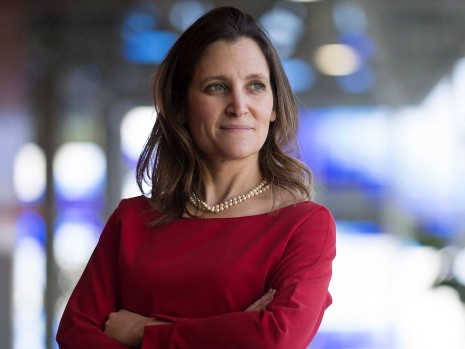NAFTA talks likely to miss key deadline


Top trade officials from Canada and Mexico say that they plan on staying in Washington DC for as long as necessary to reach an agreement on NAFTA, even as trade talks move past a key deadline on US tariffs.
Both Mexico’s economy secretary Ildefonso Guajardo Villarreal and Canada’s Foreign Affairs Minister Chrystia Freeland are saying that they would be cancelling alternate plans and are prepared to keep working in Washington on the contentious elements of the North American Free Trade Agreement renegotiation.
“I think the good news is that all three countries are really getting down to a very detailed conversation,” said Freeland, who plans to skip a key NATO summit in Brussels in order to continue the talks.
The talks will now reportedly resume on May 7, a week past a May 1 deadline set by the US earlier this year for an agreement. If no deal is reached by May 1, the US has threatened, both Canada and Mexico could lose their exemption status on newly imposed US tariffs on steel and aluminum. Concurrently, Canada is pushing for permanent exemption status from the tariffs.
Over the weekend, representatives were giving mixed reports on the overall state of the trade talks, with Rona Ambrose, a member of Canada’s NAFTA Advisory Council, saying that there’s been “a great deal of progress” made, especially on the key issue of the rules of origin concerning auto manufacturing.
“The rules of origin around automotives and making more parts and cars in North America, has always been the sweet spot to get to Donald Trump. It’s a difficult part to get through, and if we can get through this, which it looks like we have, I think it’s a very good sign,” Ambrose told CTV News.
At the same time, Canada’s chief NAFTA negotiator, Steve Verheul, said that although progress was evident, the three sides were still significantly at odds over the auto issue.
“Right now, we are still quite a distance away from any kind of agreement on the approach to auto rules of origin,” said Verheul, speaking to reporters in Ottawa. “We had issues around dispute settlement and ensuring that dispute settlement provisions will be enforceable in any kind of new NAFTA.”
“We have concerns about U.S. proposals on government procurement, we have concerns about the U.S. proposal on the sunset clause, a number of other issues that are going to be difficult to resolve,” Verheul said.

